Podcast
Questions and Answers
What is a key characteristic of disruptive technologies like Uber?
What is a key characteristic of disruptive technologies like Uber?
- Slowing down progress in various sectors
- Promoting traditional medical backgrounds
- Revolutionizing industries by combining existing technologies (correct)
- Decreasing regulatory bodies involvement
How are advancements in genome sequencing impacting healthcare?
How are advancements in genome sequencing impacting healthcare?
- Preventing the use of personalized medicine
- Enabling personalized preventive healthcare (correct)
- Decreasing the speed of diagnosing illnesses
- Increasing the cost of preventive healthcare
What is a significant focus of Singularity University related to technology?
What is a significant focus of Singularity University related to technology?
- Analyzing political impacts on technology adoption
- Exploring the intersection of fast-moving technologies (correct)
- Studying historical developments in various fields
- Researching traditional medical practices
How are wearable devices impacting individuals' health?
How are wearable devices impacting individuals' health?
How is the future of healthcare delivery changing according to the text?
How is the future of healthcare delivery changing according to the text?
Flashcards are hidden until you start studying
Study Notes
- Healthcare today is more focused on sick care rather than keeping individuals healthy, with systems set up to treat diseases reactively.
- Current healthcare systems rely on intermittent data from occasional blood pressure checks, lab tests, and vital sign checks, leading to expensive and discontinuous care.
- The most advanced technology for sharing healthcare data is still the fax machine, with prescriptions mostly on paper and records transitioning to electronic.
- Feedback loops in healthcare are often broken and intermittent, leading to costly and time-consuming processes for both patients and providers.
- There is a call for healthcare to shift from reactive and intermittent care to continuous and proactive care using technology and individual initiative to reduce costs and improve outcomes.- Shifting healthcare incentives from reimbursement-based to evidence-based medicine can lead to significant changes.
- Patients are encouraged to take a more active role in their health, becoming CEOs of their own well-being.
- Technology advancements, particularly in mobile technology, are driving significant changes in healthcare.
- Smartphones now have about a billion times the processing power of 1970s supercomputers.
- Tablets today are equivalent to supercomputers, indicating the rapid evolution of technology.
- The convergence of different technologies is where significant reinvention can occur in healthcare and other fields.
- Companies like Apple have reimagined technology use, leading to disruptive changes in various industries.
- Companies like Uber have revolutionized industries by combining existing technologies in new ways.
- Regulatory bodies and forward-thinking are essential for progress in disruptive technologies like Uber.
- The healthcare field is experiencing disruptive changes due to innovative thinking from non-traditional medical backgrounds.
- Singularity University focuses on the intersection of fast-moving technologies like medicine, biotech, robotics, and artificial intelligence.
- Exponential Medicine conferences bring together individuals from various fields to explore reinventing healthcare.
- Advancements in technology are transforming healthcare in diagnostics, therapeutics, and overall innovation.
- The cost and speed of genome sequencing are dropping rapidly, allowing for personalized preventive healthcare.
- Wearable devices and health-related apps are proliferating, empowering individuals to monitor and improve their health.
- The future of healthcare involves a significant amount of data from wearables, sensors, and connected devices.
- Analytics and predictive technologies will play a crucial role in transforming healthcare delivery and personalized medicine.
- Telemedicine is becoming more prevalent, offering online consultations and lowering healthcare costs.
- Therapeutics are evolving with the integration of artificial intelligence, robotics, and personalized genomics.
- Wearable robotics and 3D printing are revolutionizing therapeutic interventions, especially in orthopedics and cancer treatment.
- Medical education is being enhanced through technologies like Google Glass and interactive platforms.
- Crowd-sourcing health data can lead to valuable insights and advancements in personalized medicine.
- Social networks play a vital role in healthcare outcomes, emphasizing the importance of community support.
- Leveraging technologies like drones for healthcare delivery is becoming a reality, even with drug delivery via drones.
- The future of healthcare is shifting towards a proactive and continuous approach driven by rapid technological advancements.
Studying That Suits You
Use AI to generate personalized quizzes and flashcards to suit your learning preferences.




